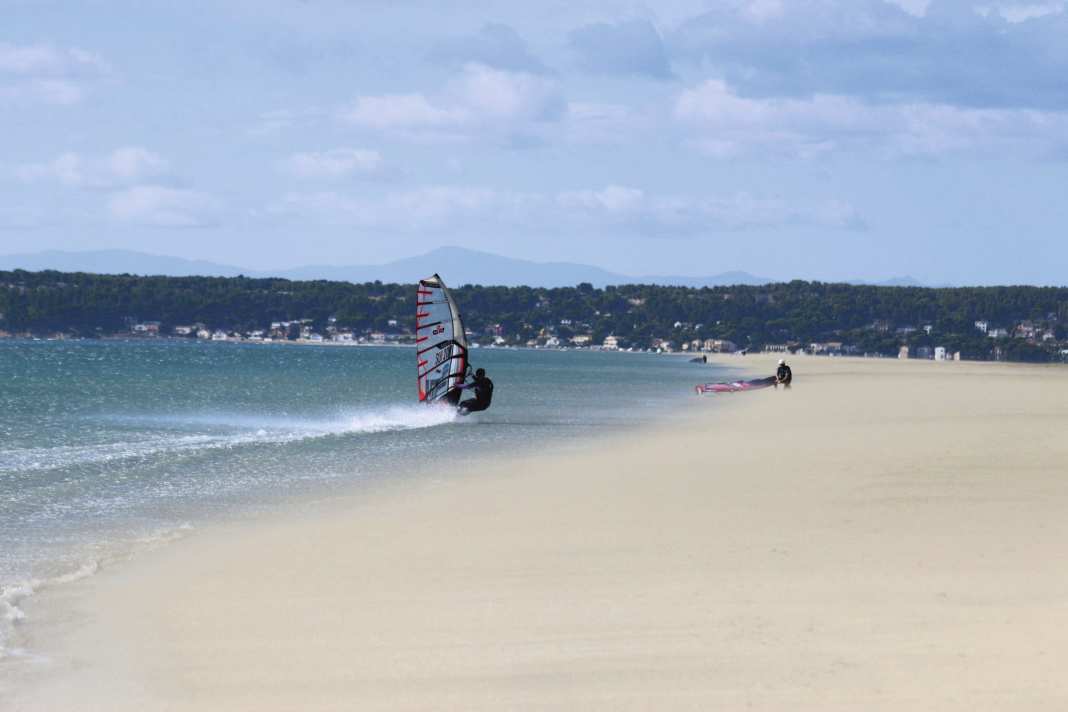




In this article, we use so-called affiliate links. With every purchase through these links, we receive a commission from the merchant. All relevant referral links are marked with . Learn more.
5000 participants can't be wrong. That's how many have already taken part in the Dunkerbeck GPS Speed Challenge. These time-limited events are also based on GPS measurements and a recognised internet platform - which is open for record attempts all year round. More than two decades ago, a small group of Dutch windsurfing enthusiasts began comparing their speeds in Excel spreadsheets. Today, this has developed into a global platform: GPS speedsurfing.
"The GPS Speedsurfing platform was founded in 2010," explains Jan Hendrik de Bruin, one of the current operators. At a time when fitness platforms such as Strava or Sports Tracker were still unknown in Europe, 20 to 30 speed freaks were already working on Excel spreadsheets to compare their surfing speed. Three or four programmers finally said: "Okay, we can do better." The development of the platform ran parallel to the technical evolution. In the beginning, special GPS devices were used, but today smartwatches from Garmin, Apple or Coros make it much easier to get started. "This has made it more user-friendly and beginner-friendly," explains Jan Hendrik.
1,000 windsurfers without wind on the beach at Défi Wind, but six to seven wind forces in Holland. This is how the idea for the virtual challenges came about.
Authorised GPS devices are becoming increasingly cheaper
The platform received an additional boost around ten years ago during a classic windsurfing event in France: "Björn Dunkerbeck was at the Défi Wind. There were 1,000 people on the beach ready to start - but there was no wind. In the Netherlands, on the other hand, it was blowing at six or seven Beaufort at the same time." This gave rise to the idea that a virtual competition could be organised anywhere and at any time. And the best thing about it: participation is free and it's one of the easiest competitions to take part in.
Jan only joined GPS-speedsurfing as an operator in 2014, but one of the original founders, Dylan de Jong, is still part of the team. Today, two of them work on the platform, supported by independent technology experts. The experts regularly test new devices. Only when a device is reliable enough is it approved for the rankings. "We have a complete list of all approved devices on the website and it is constantly growing." Thanks to technical progress, many things are now possible that were previously only possible with high-end devices: "If you buy a watch for less than 200 euros today, you can have a fully approved device."
Alternative for smartphones: the Waterspeed app
One example is the Garmin Forerunner: "One of the cheapest watches on the market. I think it costs less than 200 euros." If you only want to check your speed occasionally, you can also use other devices - with certain restrictions. "Sometimes there are small outliers where the speed is displayed too high. Then we get a flag displayed." However, this is extremely rare: "With 30,000 sessions per year, we are talking about fewer than ten or 20 that are conspicuous." The platform uses the GPS Results engine - developed by German windsurfer Manfred Fuchs - for its calculations. "We have over 20 years of data stored, so we can also make predictions and evaluate sessions. All sessions are checked automatically."
In addition to watches, smartphones can also be used; the Waterspeed app is a good option and works on Apple and Android. There are no participation fees and inclusion in the ranking is free of charge. Only those who want additional statistics, for example for certain spots or countries, and analysis functions can take out a premium membership, which helps to finance the part-time project.
You race against the top stars of the speed scene - or against your mates
"The simplest principle is the annual ranking," says Jan Hendrik. "If a session is posted in a certain year, it appears in the ranking for that year depending on its speed. There are also location-based rankings. For example, I surf a lot in Makkum and can create a special ranking for Makkum."
Time periods can also be defined for a speed event - a method used in the already legendary Dunkerbeck Challenge. You can surf at any spot worldwide and every speed recorded between the start and end date counts towards the ranking. You compete against thousands of other speed surfers and also against the "big names". If you want to increase your chances of winning the title, you can easily create your own events as a premium member - for the local surf club or a challenge with just the five best buddies.
Dunkerbeck GPS Speed Challenge 2025
- 01.07.-31.08.2025 Period 2: The Summer Edition
- 01.10.-30.11.2025 Period 3: The Third
- Info under surfbd.com/dunkerbeck-speed-challenge/
What you need to take part
- Account with gps-speedsurfing.com
- a "device" - i.e. an authorised Smartwatch, a special device or simply an app (on your mobile phone or Apple Watch)
- a waterproof cover
- a fast fin
More about speed surfing:
- These are the speed records in windsurfing
- The best tips for speed windsurfing from Andy Laufer
- From building contractor to speed surfer: how Andrea "Principe" Baldini became the "Prince of Speed"
- Speed surfing: "The ultimate goal is 100 km/h" - Interview with Antoine Albeau
- Jenna Gibson on the Lüderitz Speed Challenge and her world record
- "Speed is like ski jumping" - Interview with Gunnar Asmussen

Stephan Gölnitz
Deputy Editor in Chief surf

